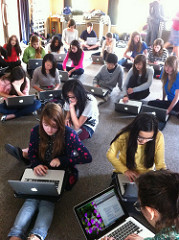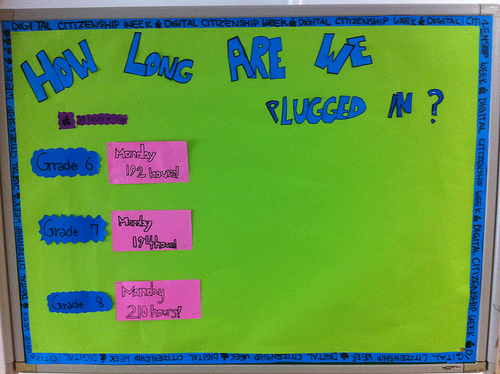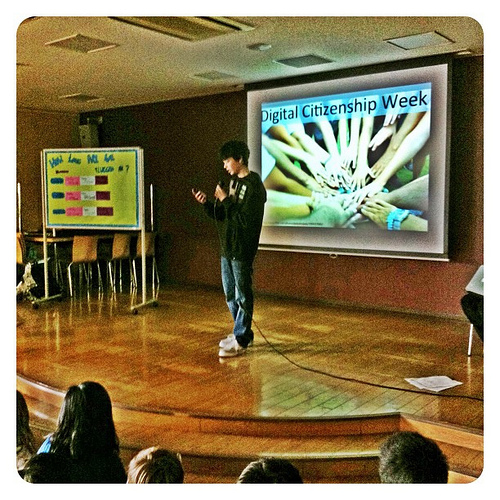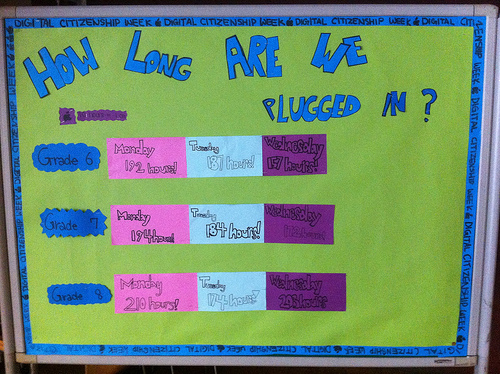Digital Citizenship Week

Cross-Posted at Always Learning
Last week was our first Digital Citizenship Week at YIS, and it was fantastic! We focused primarily on the Middle School to get an idea of how an event like this would work for our students, teachers and parents. Here’s what we did:
Learning objective: A renewed focus on the choices we make and how they affect us, specifically about balance, responsibility and safety.
Guiding Question: How are you a responsible digital citizen?
Conversation Starters (Daily Theme)
We started each day with an open discussion (based on the themes listed below) in morning tutor group (homeroom) inspired by a short video (see videos and guiding questions at the links below). Our goal was to get students thinking about the big ideas behind digital citizenship, and give them an opportunity to reflect on the choices they make.
Estimating & Tracking Time Spent Online
Tools and ideas to transform education. Sign up below.

A huge thanks to Rebekah and the MS Student Council for running this entire activity, you guys are amazing!
On Monday, we asked our students to estimate the amount of time they spend online (at their grade level, and as a whole middle school). Each student had the opportunity to guess how much time we spend online, with the winners announced at our MS Assembly on Friday.
At the time time, we asked students to start tracking the amount of time they spend online. They had three options to do this: use Rescue Time (which would allow them to automatically track what they were doing and when), use this simple Balance Journal spreadsheet as a template to keep track of their own hours, or keep a paper journal.
The amazing MS Student Council, particularly Sophie and Naomi, kept an updated bulletin board in the Main Lobby to show our daily results:

On Thursday, we asked all students to share the amount of time they spent online each day (Monday, Tuesday and Wednesday) so that we could calculate the numbers and announce a winner the next day.
Special Tutor Group Activities
Each middle school tutor group has a weekly 45-minute meeting for pastoral care. This week, every group did the same set of activities (see lesson plans here):
1. A short digital citizenship survey (this is a .pdf, since the survey is closed to YIS accounts only, to make sure the data we receive is actually from our students). The survey is based on this Google Doc, thanks to all who contributed!
2. Adding a pin to our collaborative map to see how, where and when we connect
View Our Global Connections in a larger map
3. Adding a slide to our collaborative presentation to highlight something we learned together this week
Special Sessions
Each middle school year group had a 90-minute pull-out session with either me, Adam (MS Counselor), or Damien (Secondary Technology and Learning Coach). These activities were based on the ones we ran at the beginning of the school year, during our CLC orientation (two days of non-formal school).
- Grade 6: Behavior: An Over-the-Top Lesson Skit, based on this Arrested Development episode, with Kim
- Grade 7: Balance: Maintaining Balance, with Adam
- Grade 8: Responsibility: Digital Citizenship Court (using these Digital Citizenship Scenarios), with Damien
Subject-Based Digital Citizenship Focus
Several subject areas were also able to devote time to Digital Citizenship during their classes for the week as well:
- PE: Balance
- Technology: Grade 6 and Grade 7 also completed the Digital Citizenship Court activity
Middle School Assembly
On Friday, Rebekah and the amazing MS StuCo team put together another fantastic assembly highlighting the thinking that went on during the week.
As students were filing in, a video highlighting some of the results to the question: “To me, digital citizenship means…” from our survey played on a loop. Here are a few of the responses:

To me, digital citizenship means….
- Being a good, thoughtful person online.
- To me I think it means to use your technology responsibly.
- I think digital citizenship is how you use your computer overall. If you mostly go on Skype or Facebook to chat, or if you go on youtube to watch videos, or even if you download stuff illegally. Digital citizenship is how you spend your day with the computer, do you do the right things or the wrong things?
- I think digital citizenship basically means being good and responsible online, which includes tons of different things. They can be from not revealing personal information, to being nice to people instead of cyber bullying.
- It means being a part of a community where you get to know people that live in a different place/country than the one you live in.
- To be a good citizen online and offline and to balance your time on an electronic device with your time you spend with family and friends.
- To me, digital citizenship means to behave properly on the internet. Digital citizenship is basically general citizenship, although the only difference is that it’s online. It’s saying something over the internet that you would say face to face. Digital citizenship is being responsible for your actions online.
- Being responsible, caring, sympathetic, and open minded for you actions online and what you write and considerate of other peoples feelings. As well as the amount of time you spend online.
- Taking care of each other
- Your reputation online and how you act online.
- Being in a community and respecting each other on internet.
- To be responsible and respectful online to other people, what they have created and what belongs to them. Also to be aware of the consequences and dangers on the internet.
- to me, digital citizenship means to be a responsible and balanced user on online.
- …being an online member of the internet community and using the powers of the web responsibly.
Throughout the assembly, highlights from the week, as well as examples of digital citizenship from throughout the year were shared (thanks to our amazing humanities teachers Alex and Rebekah, and our Digital Dragons curriculum). One student per tutor group speaking about what they learned this week, as part of our collaborative presentation activity (see above). We ended the assembly with the winners of the Estimating Time Spent Online challenge:

Final Thoughts
An enormous thank you to Rebekah, Adam, Susie, Damien and the rest of our fabulous MS teachers for making this week a success! Big events like this kind of freak me out, so I never would have been able to even attempt coordinating something like this without my fantastic colleagues.
Rebekah and I had a chat yesterday to reflect on how things went, and really, they went well. We have some ideas for next year, of course:
- We need to clarify what our focus words are (the daily themes), and re-use them throughout the year – would be great to have posters, or other activities throughout the year highlighting these themes, like we do with the IB Learner Profile.
- Timing: coordinating Digital Citizenship Week with #beyondlaptops was an idea that sounded great in theory, but was kind of crazy in practice. Plus, this year it feel the week before MS Exams (which was really not fun for anyone). So next year, we’re thinking we should move it to before Feb break, the week of Feb 11 – 15
- It would be great to see more involvement from different subject areas, we have ideas, and we’ll seek input from the department heads and subject-area teachers to make this relevant to their curriculum at the time.
- We would love to have HS students facilitate conversations from their perspective – what would you tell the 11 year old you? Maybe they could they facilitate the double-block pull out?
- The map idea was cool, but not sure the kids understood what it was – we can either drop it, or have it take place during a specific lesson so that there’s a discussion around why it’s important
- Would be nice if the survey could include time for discussion as well. Next year we’ll use the same questions, so that this year’s questions become the baseline.
- We need to make sure to filming some activities to show later – they were great!
- We would love to coordinate timing so we can collaborate with other schools – this was an idea that actually came up last year, but I was never able to follow through. Next year for sure!
Do you have a Digital Citizenship Week at your school? How do you help bring the concepts behind digital citizenship alive with your students?
Image Credits:
- Keeping track of time we spend online by superkimbo, CC Licensed on Flickr
- Day 1 by superkimbo, CC Licensed on Flickr
- How to achieve balance by gr7 by superkimbo, CC Licensed on Flickr
- Gr8's discussing responsibility by superkimbo, CC Licensed on Flickr
- Grade 6's using the CLC Handbook by superkimbo, CC Licensed on Flickr
- Yuki starting the MS Assembly by superkimbo, CC Licensed on Flickr
- Day 3 by superkimbo, CC Licensed on Flickr
